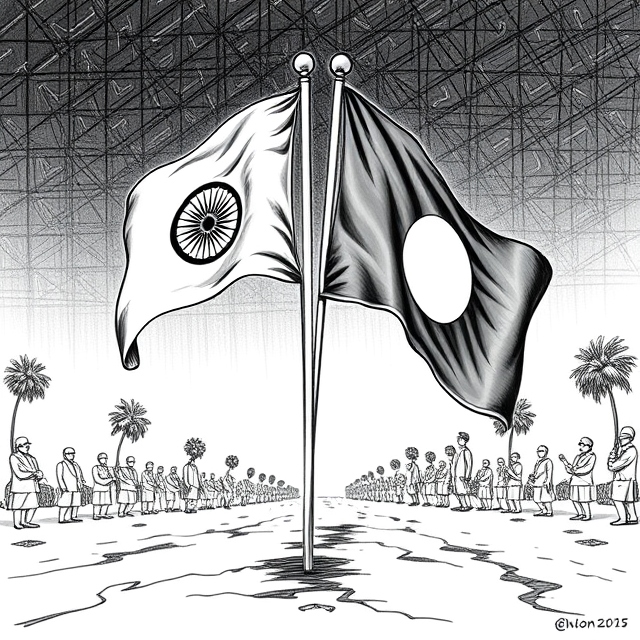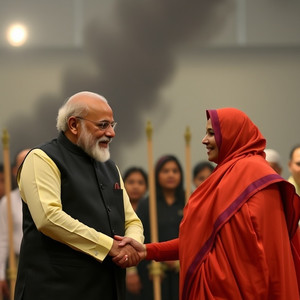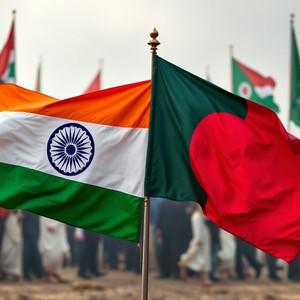
Relations between India and Bangladesh have soured due to diplomatic tensions, economic stagnation, and political allegations involving Sheikh Hasina’s ousting.
Anti-India sentiment and minority rights violations in Bangladesh, particularly against Hindus, have drawn global criticism from nations like the U.S., U.K., and Israel.
Bangladesh’s growing alignment with Pakistan reflects shifting geopolitical dynamics, driven by perceived imbalances with India.
Bangladesh, a country created with the help of India and whose nationalist movement was inspired by Indian nationalism, has recently witnessed a significant turn of events. Since August 5th, following the fall of former Prime Minister Sheikh Hasina, the new interim regime under Mohammad Yunus has attempted to go against the historical ties between India and Bangladesh. This regime seems to be neglecting the strong bilateral relationship that once defined the two nations.

It is important to note that the ousting of Prime Minister Sheikh Hasina occurred after widespread student protests across Bangladesh. The protests were triggered by the reinstatement of a 40% reservation for military veterans in government jobs. Although Sheikh Hasina had removed this reservation back in 2018, the High Court of Bangladesh reinstated it in June this year, stating that the 40% reservation for military veterans must be upheld.
When the interim government was formed, it raised several issues. One notable controversy arose regarding Sheikh Hasina’s resignation. Reports claim that while leaving Bangladesh, Sheikh Hasina did not sign a resignation letter addressed to the President. This controversy deepened when the President of Bangladesh recently clarified that Sheikh Hasina had not formally resigned. This situation has sparked debates about the illegitimacy of the interim government in Bangladesh.
Diplomatic & Political Allegations Between India and Bangladesh
The major differences between the interim regime of Bangladesh and India arise from allegations that India has illegitimately granted political asylum to former Prime Minister Sheikh Hasina and is using her to interfere in Bangladesh’s political affairs. Officially, the whereabouts of Sheikh Hasina remain unclear. Another reason for the differences is Bangladesh’s demand for mutual respect from India. Due to these issues, ties between the two countries have stagnated.

Economic relations have significantly declined, with Bangladesh reducing its imports from India. Additionally, Bangladesh has halted ongoing Indian-funded infrastructure projects within the country, bringing them to a standstill. Furthermore, Bangladesh has not paid the outstanding electricity dues owed to one of India’s private companies, the Adani Group. These actions stem from Bangladesh’s perception that India is interfering in its political affairs.
Specifically, the economic relationship between India and Bangladesh has faced setbacks. Bangladesh has halted fish exports to India along with other maritime exports. Additionally, Bangladesh has also suspended India’s internet connectivity project with the northeastern region. India had planned an undersea cable connectivity route from the port of Chennai to Singapore, passing through Bangladesh to link with northeastern India. However, Bangladesh has put this project on hold. Consequently, overall economic cooperation and development between the two countries have stalled.
It is important to note that there is no clear evidence of India interfering in Bangladesh’s political matters. India has consistently upheld the principle of respecting the sovereignty of other nations. Despite this, public sentiment in Bangladesh has turned against Sheikh Hasina, and there have been calls to boycott Indian goods. This move appears to lack any substantial justification and is influenced more by religious sentiments than concrete political reasons.
The anti-India sentiment in Bangladesh is evident in several actions, such as halting economic projects and showing disrespect towards the Indian flag within Bangladesh. Public demonstrations by the Bangladeshi people have called for India to reconsider its ties with Bangladesh. Additionally, the anti-Hindu rhetoric is apparent through continuous attacks on Hindu temples and the disrespect and marginalization of Hindu minorities in urban areas.
It is also noteworthy that, under the current interim regime, Bangladesh is fostering closer ties with Pakistan. This is a significant irony, as Pakistan’s army was responsible for the genocide of the Bengali Muslim population of East Pakistan, which justified India’s initial intervention. The hypocrisy of fostering ties with a nation that was once complicit in atrocities against its people highlights a lack of historical awareness and strategic learning.
The relationship between Pakistan and Bangladesh has been complex, especially in the context of elections. Since 1971, when the Awami League came to power in Bangladesh, it has maintained an anti-Pakistan stance. However, when the Bangladesh National Party (BNP) was established, it called for improved ties with Pakistan.
It is important to understand the geopolitical dynamics at play. Bangladesh, perceiving itself as a smaller territory compared to India, has historically believed that strengthening relations with Pakistan could help enhance its deterrence capabilities. The idea is that closer military relations with Pakistan could create a strategic balance and act as a countermeasure to India’s dominance in the region.
In light of the strained relations between India and Bangladesh, India’s current Foreign Secretary, Mr. Vikram Misri, undertook a two-day visit to Bangladesh. During this visit, he addressed the ongoing diplomatic issues between the two countries. However, the discussions did not lead to any concrete conclusions, as both parties remained firm on their respective positions.

The Indian government, through Foreign Secretary Vikram Misri, emphasized the importance of maintaining strong diplomatic ties and ensuring the safety and protection of the Hindu minority in Bangladesh. On the other hand, the Bangladeshi government maintained that the issue of the Hindu minority is a domestic matter. Additionally, Bangladesh raised concerns over India’s alleged involvement in its internal affairs, citing India’s granting of asylum to Sheikh Hasina as a point of contention.
International Reaction to the Ongoing Bangladesh Saga

Source: The Indian Free Press
The ongoing atrocities against Hindu minorities in Bangladesh and the complete lack of willingness by the Bangladeshi interim government to address this crisis have become a central issue. Multiple countries, including the United States, the United Kingdom, and Israel, have brought this matter to global attention.
The United States, under its current administration, has stated that it is closely monitoring developments in Bangladesh and has urged the Bangladeshi interim regime to respect the rule of law. However, this stance reveals a double standard, as the U.S. has often been a vocal critic of minority rights in India, despite the fact that the situation of minorities in India cannot be equated with that in Bangladesh. This selective criticism highlights America’s tendency to cherry-pick issues based on convenience.
Former U.S. President Donald Trump, however, has shown greater willingness to address the plight of Bangladeshi Hindus. He has emphasized that such atrocities would not have occurred under his leadership and called on Bangladesh to end its persecution of minorities.
The issue was also raised in the United Kingdom’s Parliament by Labour MP Barry Gardiner. In response, Catherine West, the UK’s Foreign Affairs Minister for the Indo-Pacific, stated that Bangladesh must protect its minorities. This reflects growing international concern over the treatment of minorities in Bangladesh and calls for action from the Bangladeshi government.
Meanwhile, countries like Israel remain steadfast supporters of the rights of Bangladeshi Hindus and have urged the Bangladeshi government to address these concerns.
A few measures to address the atrocities against minorities in Bangladesh include applying international pressure on the interim government to ensure religious freedom and protect minority rights. Additionally, greater media coverage is essential—not just by Indian media but also by Western media—to highlight these issues and bring them to global attention. This increased awareness can help mobilize the necessary actions to safeguard minority communities in Bangladesh.
References:
https://indianexpress.com/article/explained/engaging-with-bangladesh-9717934
Aayush Pal is a freelance writer on contemporary geopolitical developments. The views expressed in his work are entirely his own.
